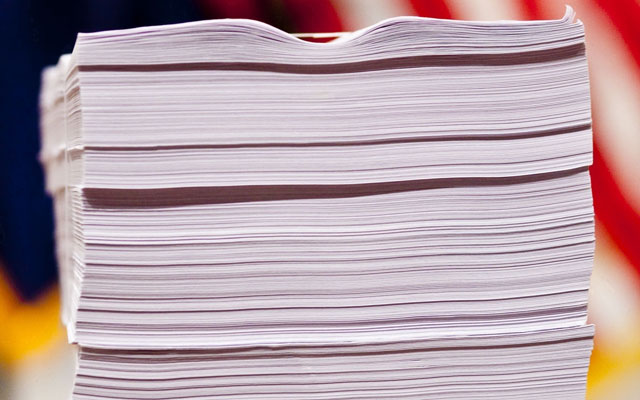The Congressional Budget Office (CBO) issued a new statement on the budgetary effect of repealing the Affordable Care Act (Obamacare) for fiscal years 2014 to 2023. The CBO did not model or update a full scoring of repeal. It found that the cost of Obamacare has increased by $30 billion since last July’s estimate for the fiscal years 2014–2022, but thinks this could be offset by more cost savings and tax revenue by extending the timeline an additional year.
The idea that cost savings are likely to increase is peculiar given that President Obama relied on Medicare cuts. Obamacare cuts $716 billion from Medicare over the next 10 years, according to previous CBO estimates.
The Daily Signal depends on the support of readers like you. Donate now
However, the most recent budget baselines from the CBO lowered the cost of Medicare over the same time period by $143 billion. With Medicare’s base cost lowered, the President’s Medicare cuts should also be smaller than previously projected by the CBO. This is because payment rates for both Medicare Advantage and provider payments would be expected to be smaller and therefore the cuts would be somewhat smaller.
In fact, the CBO has previously said that when the projected cost of Medicare falls, the savings from repealing Obamacare would also change. Last summer’s letter to Speaker John Boehner (R–OH) said, “CBO’s current projections of Medicare spending are lower than those in the January 2011 baseline. In aggregate, therefore, the projected increase in spending from repealing the Medicare provisions of the ACA is also smaller.” Given that projected Medicare spending has again fallen since that summer, the repeal score must have changed.
One fascinating number in this new scoring update is the continual decline in the cost of the small business health care tax credit. Small businesses have little interest in engaging in a program that is cumbersome, confusing, and potentially costly. The enrollment rate of small businesses has been far below CBO estimates and as a consequence, the CBO has continually lowered its cost estimate of this tax credit.
In February 2011, the CBO estimated the cost of the tax credit to be $40 billion. The next year it fell 40 percent to $24 billion. In the May update, it fell again to $14 billion, one-third of the estimate just two years ago.
Obamacare is one of the largest and most costly and complex pieces of legislation enacted by Congress in the past 50 years. The CBO should continue to update its model and re-estimate the cost of repeal to provide policymakers with good information. When facts change, the CBO should change its assumptions and thoroughly explain these changes.































